Key takeaways:
- Consumer protection laws are essential for safeguarding consumer rights against unfair marketplace practices, including privacy concerns in the digital age.
- Investment scams often involve high-pressure tactics, lack of transparency, and promises that seem too good to be true; recognizing red flags is crucial.
- Thorough research, including evaluating the credibility of sources and understanding risks, is fundamental for safe investing and avoiding fraud.
- Maintaining skepticism, conducting preliminary investigations, and engaging with community resources are effective strategies for avoiding scams and making informed decisions.
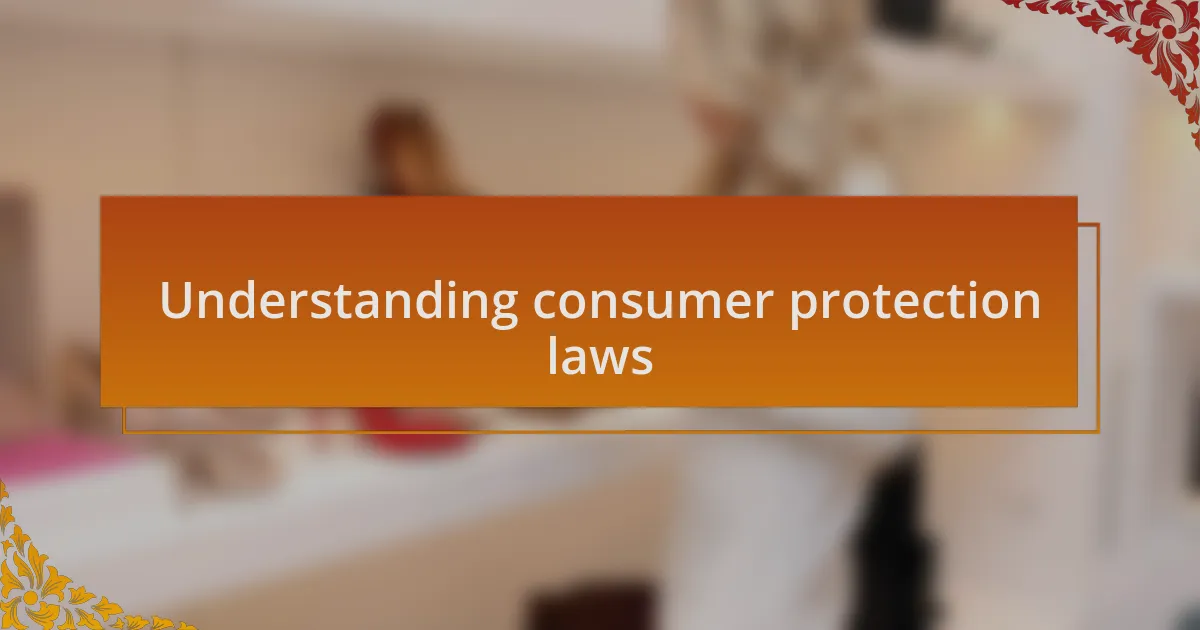
Understanding consumer protection laws
Consumer protection laws are designed to safeguard individuals against unfair practices in the marketplace. I remember the first time I navigated through a confusing product return process, thinking, “Why is this so complicated?” Understanding these laws can empower you to stand up for your rights as a consumer, ensuring that you aren’t taken advantage of when purchasing goods or services.
These laws vary from country to country but generally focus on issues like false advertising, defective products, and unfair treatment. I recall the frustration I felt when a company failed to deliver on a promise, leaving me wondering if anyone would hold them accountable. It was a relief to discover that, in many situations, I had legal recourse and could seek restitution.
Moreover, consumer protection encompasses various regulations that address privacy concerns, especially in our digital age. When I learned about data protection laws, it dawned on me how crucial it is to know my rights regarding personal information. Have you ever wondered what happens to your data after you hit that “accept” button on a website? Understanding these laws can help you navigate the complex landscape of modern consumer rights, making you a more informed and confident shopper.
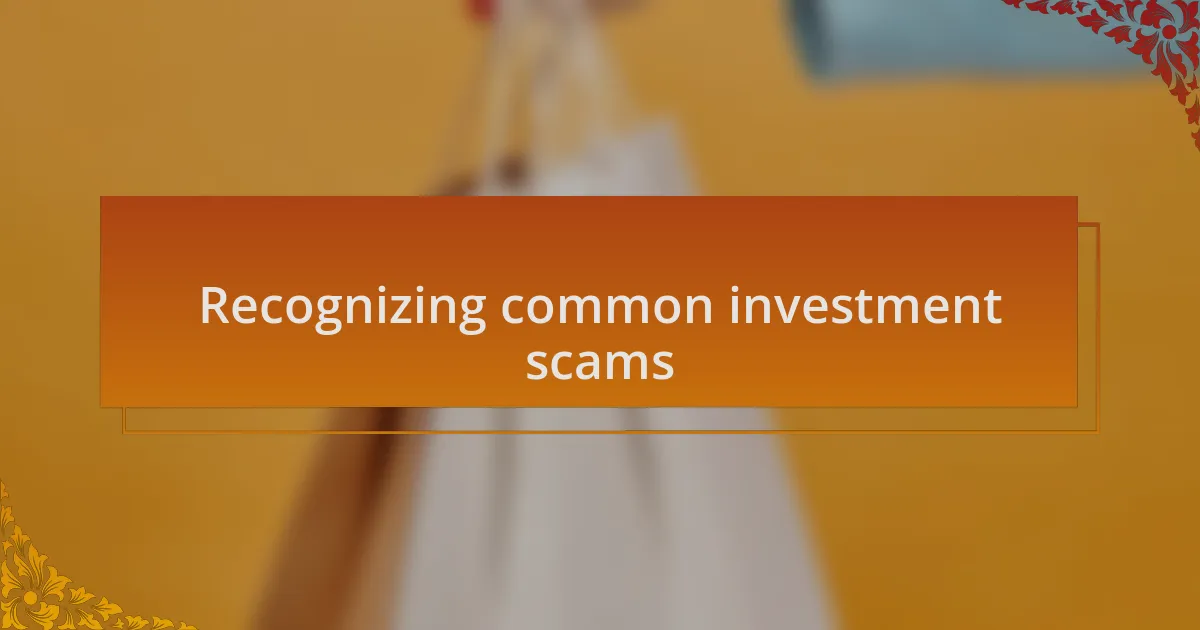
Recognizing common investment scams
Investment scams can often come wrapped in enticing offers that seem too good to be true. I remember receiving a call about an investment opportunity that promised astonishing returns with minimal risk. My intuition kicked in immediately, and I asked myself, “If it sounds too good to be true, could it really be?” This skepticism led me to dig deeper, unveiling the red flags that many overlook.
One common tactic in these scams is the pressure to act quickly, often accompanied by high-pressure sales pitches. I’ve experienced this firsthand with a so-called “exclusive” investment club that urged me to join before the next wave of profits rolled in. I paused and thought, “Why the rush? Genuine opportunities should allow time for thorough research.” Understanding the timeline of a legitimate investment can be crucial in avoiding these traps.
Another red flag is the lack of transparency surrounding the investment details. I once stumbled upon a website that provided barely any information about the company or the individuals behind it. The absence of clear details made me wonder, “Who are these people, and why are they hiding?” Recognizing such signs can protect you from falling into a fraudulent scheme, ultimately leading to wiser financial choices.
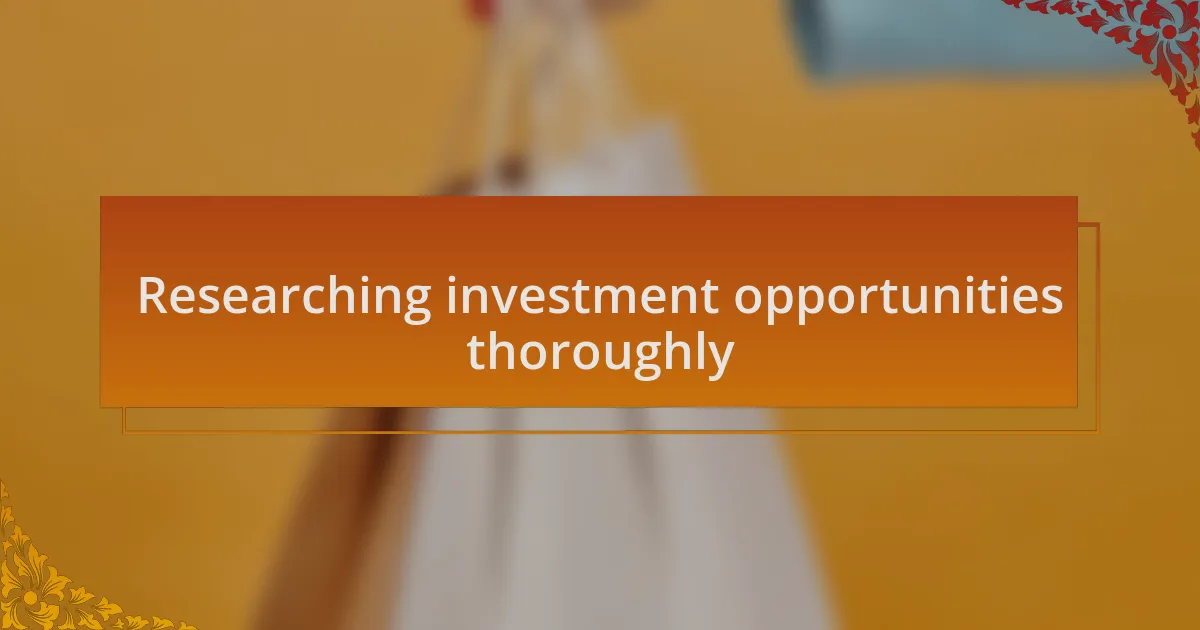
Researching investment opportunities thoroughly
When researching investment opportunities, I often find myself diving into a rabbit hole of information. For instance, I remember scrutinizing a tech startup that claimed to have a groundbreaking product. As I peeled back the layers, I realized their website lacked basic credibility signs, like a clear business model or verifiable testimonials. It was a wake-up call—what if I had invested without asking those crucial questions?
Sometimes, taking a step back really helps clarify things. I vividly recall speaking to a friend who got swept up in a “once-in-a-lifetime” investment in cryptocurrency. As he excitedly shared his plans, I asked him what research he had done. He hesitated and admitted he hadn’t looked beyond the initial buzz. It hit me then—investing isn’t just about jumping at opportunities; it’s about building a solid foundation of knowledge first.
I often use checklists to guide my research process. One time, I created a list of essential questions to evaluate an investment: What’s the company’s track record? Who are the key players involved? What do independent reviews say? By systematically answering these questions, I felt more confident in my decisions. Have you ever considered how thorough research could empower you to make better financial choices? It’s not just about avoiding scams; it’s about cultivating a deeper understanding of where your money goes.
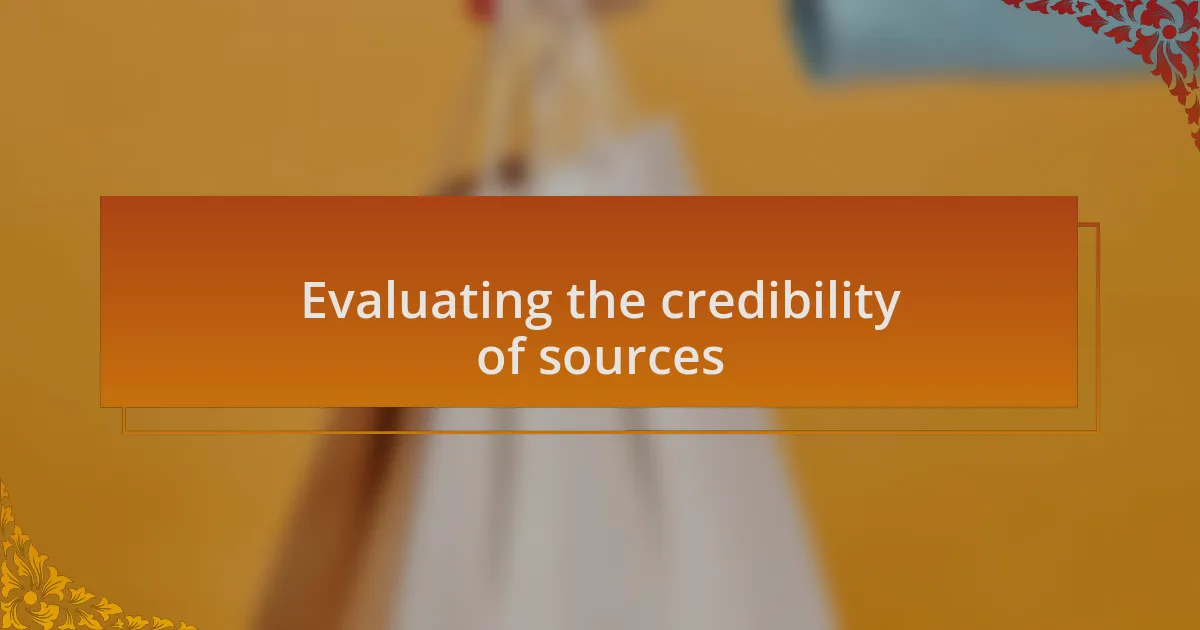
Evaluating the credibility of sources
Evaluating the credibility of sources is a vital step in the investment process. I remember reading an article that hyped an investment opportunity with sensational claims but provided little to no background information on the author. It struck me that if the source was anonymous or had unclear credentials, the information could easily be misleading. It made me wonder: how often do we accept information at face value without questioning its origin?
I also find that cross-referencing multiple sources greatly enhances my understanding of an investment’s legitimacy. Once, I stumbled upon a glowing review of a start-up on one platform, only to discover critiques on established investment blogs. This disparity made me pause and assess the motives behind the praises. Are those positive reviews sponsored or biased? These moments remind me that a deeper dive often reveals the true picture behind what seems promising.
Engaging with user-generated content can provide valuable insights too. I once participated in a discussion forum where someone shared their horrendous experience with a so-called “guaranteed return” scheme. Reading their account not only highlighted red flags but also reaffirmed that firsthand experiences can be just as credible, if not more, than polished advertisements. Have you ever thought about how community experiences can guide your investment decisions? In my case, they often serve as essential warning signs.
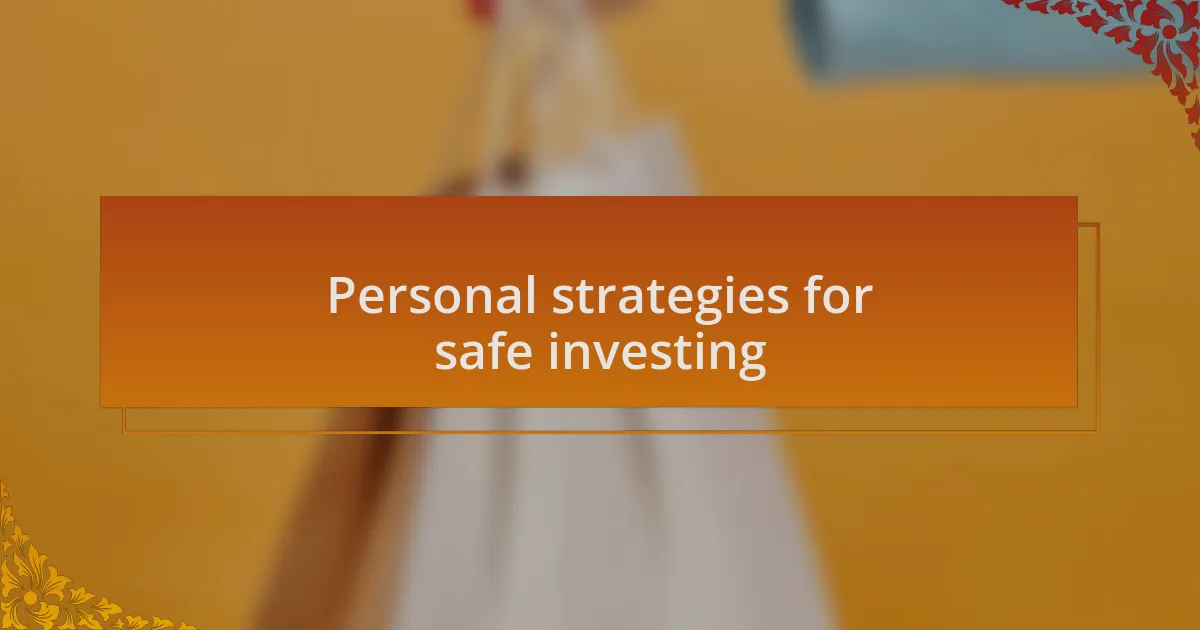
Personal strategies for safe investing
When it comes to safe investing, I highly recommend setting your own risk tolerance before diving into opportunities. One time, I rushed into a flashy investment that promised quick returns without assessing whether it matched my financial goals. It was a costly lesson that taught me to always consider how much risk I could handle emotionally and financially. Have you ever jumped into an investment because it seemed exciting? I’ve learned that a clear understanding of my limits makes it easier to walk away from tempting but risky ventures.
Another strategy I find essential is to start small. I remember my first leap into the market was with a modest amount, which allowed me to learn without the pressure of significant loss. As I gained insights and confidence, I gradually increased my investments. How often have you heard “go big or go home”? In my experience, the slow and steady approach not only builds knowledge but also helps in making more informed decisions down the line.
Lastly, I believe in the power of keeping a keen ear to the ground about market trends. Attending local investment seminars has been eye-opening for me. I recall a panel discussion where experts emphasized the importance of staying updated on industry developments rather than just following popular advice. It made me realize that proactive learning—seeking out fresh information and diverse opinions—is crucial to guarding against fraud. How often do you seek knowledge beyond the typical sources? For me, staying informed feels like having a safety net in the unpredictable world of investment.

Lessons learned from my experience
I realized early on that trusting my gut can be misleading. I remember a time when a friend convinced me to invest in a start-up they were passionate about, and I felt inclined to support them. It ended up being a significant waste of money, and that taught me the hard way: I need to prioritize facts and research over emotions, especially when it comes to financial decisions. Have you ever let personal relationships sway your judgment? It’s essential to separate friendship from finances to protect yourself.
As I navigated my investment journey, I developed a heightened sensitivity toward red flags. There was an instance when an opportunity seemed too good to be true, promising large returns with minimal risk. Instead of dismissing my initial skepticism, I took a step back and consulted trusted financial advisors. This experience reinforced the value of seeking diverse opinions and trusting my instincts when something feels off. Isn’t it refreshing to know that skepticism can be a safeguard in financial dealings? It truly empowers me to investigate deeper before committing.
One of the most impactful lessons for me has been understanding the importance of due diligence. I remember researching a potential investment extensively, scouring online forums and asking pointed questions within my network. It paid off when I uncovered unfavorable reviews that confirmed my doubts. It felt reassuring to have my findings align with my reservations. How often do we overlook the importance of thorough research? I now see it as my first line of defense against falling for fraudulent schemes.
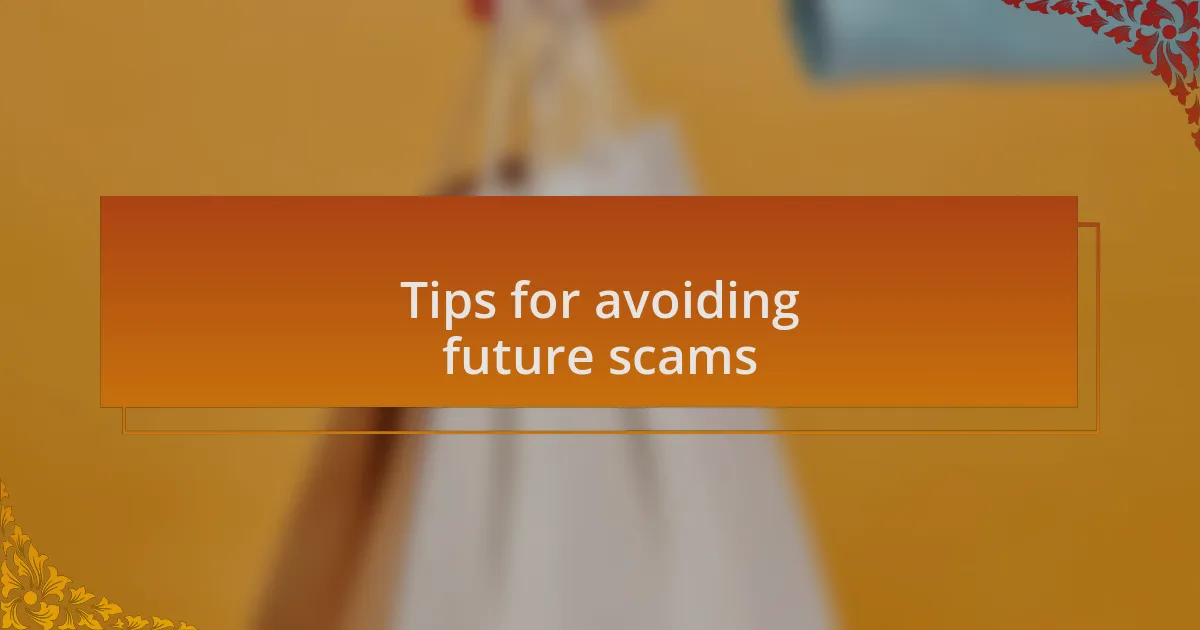
Tips for avoiding future scams
When it comes to avoiding future scams, one key strategy I’ve adopted is to establish a robust preliminary investigation routine for any investment opportunity. I remember a time when I thoughtlessly skipped this step out of enthusiasm for a project my friend was launching. That decision backfired, highlighting how crucial it is to verify credentials, read reviews, and understand the business model behind every investment. Have you ever assumed something was legitimate simply because someone you knew was involved? Walking this fine line requires diligence and skepticism.
Another vital tip I practice is to maintain a healthy level of skepticism, particularly regarding high-pressure sales tactics. I can vividly recall receiving an urgent call pushing me to invest immediately for a “limited-time offer.” Instead of succumbing to the pressure, I took a breath and asked detailed questions. Reflecting on that moment, I realized that legitimate opportunities should never rush you into decisions. How much easier is it to take a step back and grant yourself time to think?
Lastly, I make it a rule to connect with community resources, like local consumer protection agencies, or online forums dedicated to vigilance against scams. There was a particularly eye-opening experience when I attended a seminar that armed me with knowledge on current scams. Listening to others share their stories illuminated the tactics employed by fraudsters. Have you thought about what you could learn from shared experiences? Those insights not only bolster my defenses but remind me that I am part of a community looking out for one another.